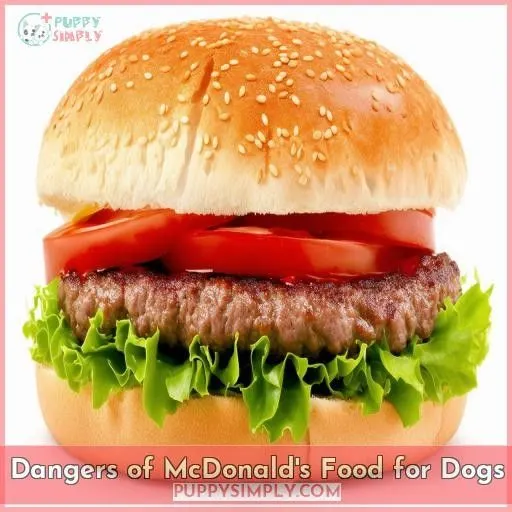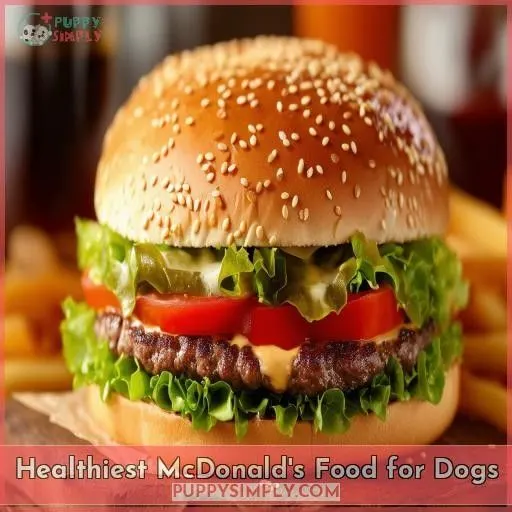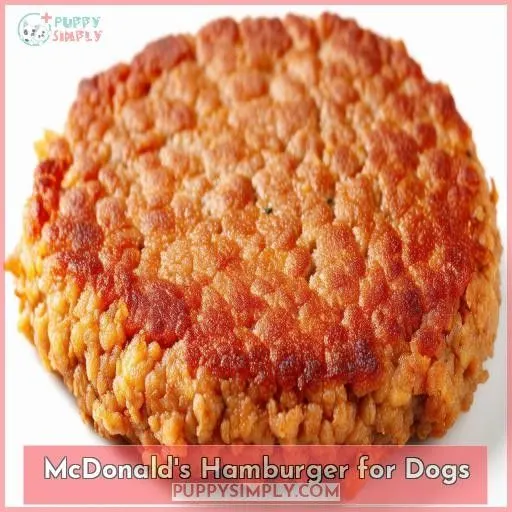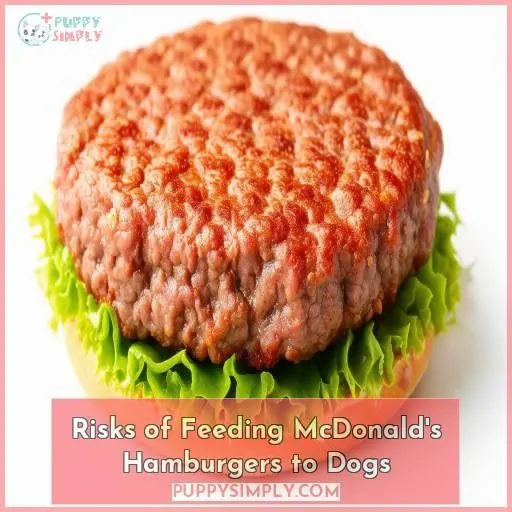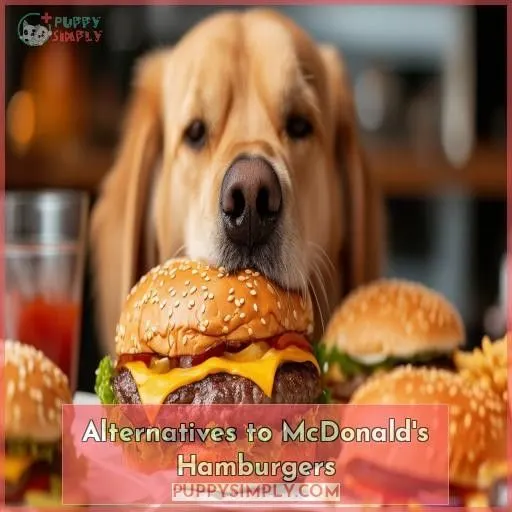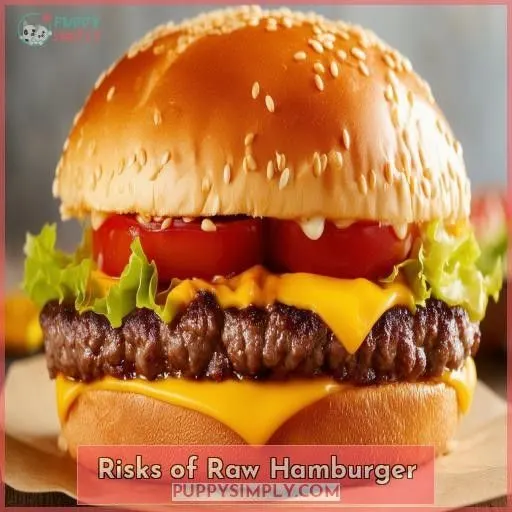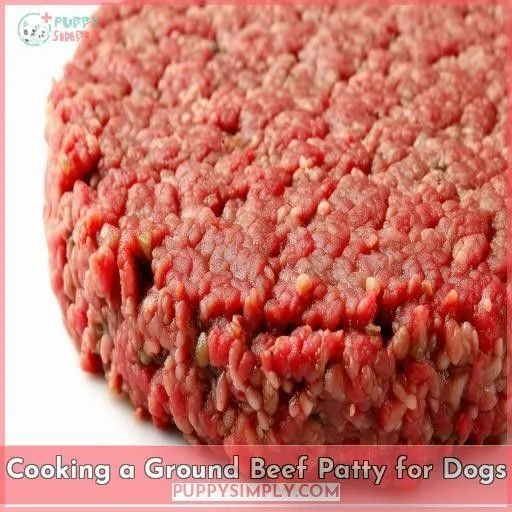This site is supported by our readers. We may earn a commission, at no cost to you, if you purchase through links.
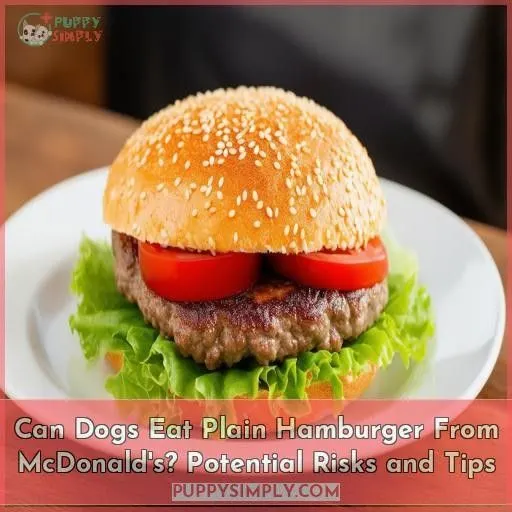
The hamburger patty itself contains protein and fat that are generally safe for dogs in moderation. However, be cautious about the high fat content and avoid feeding it to small dogs.
Additionally, make sure your pup drinks plenty of water afterwards to help with digestion.
With a few precautions, an occasional plain McDonald’s hamburger can be an acceptable treat – but stay tuned for more tips on healthier options.
Table Of Contents
- Key Takeaways
- Can Dogs Eat Plain Hamburger From Mcdonalds?
- Dangers of McDonald’s Food for Dogs
- McDonald’s Policy on Pets
- Healthiest McDonald’s Food for Dogs
- McDonald’s Hamburger for Dogs
- Risks of Feeding McDonald’s Hamburgers to Dogs
- Alternatives to McDonald’s Hamburgers
- Risks of Raw Hamburger
- Cooking a Ground Beef Patty for Dogs
- Additional Tips
- Frequently Asked Questions (FAQs)
- Is plain hamburger ok for dogs?
- Can dogs eat fast food burgers?
- Are McDonald’s dog friendly?
- Is McDonald’s hamburgers real hamburger meat?
- Can dogs eat McDonalds chicken nuggets?
- Is the McDonalds ice cream machine ever working?
- What is the pink slime in McDonalds burgers?
- How much does a McDonalds dinner box cost?
- Can dogs eat McDonalds french fries?
- Conclusion
Key Takeaways
- Doggos can have a plain McDonald’s patty as an occasional treat, but hold the bun, ketchup, and other toppings that could be rough on their tummies. The high fat and salt content isn’t ideal, but it likely won’t hurt them in moderation.
- While a burger patty may seem like an easy way to make your pup’s tail wag, it’s better to opt for quality time together through playtime, walks, or a trip to the dog park. Your furry friend values the bonding experience over any fast-food indulgence.
- Feeding raw hamburger meat is a big no-no, as it could harbor nasty bacteria like Salmonella or E. coli that could make both you and your pup sick as a dog. Always cook ground beef thoroughly to avoid any tummy troubles.
- If you do decide to treat your canine companion to a McDonald’s patty, make sure they stay well-hydrated afterwards. The high sodium content could leave them feeling parched and in need of some serious H2O to avoid any digestive upset or dehydration.
Can Dogs Eat Plain Hamburger From Mcdonalds?
Yes, dogs can eat plain hamburger patties from McDonald’s, but it’s important to be aware of potential risks. Avoid feeding them the bun, condiments, or toppings to minimize digestive issues. Make sure they’ve plenty of water afterward to aid digestion and consider healthier alternatives. (Source)
Dangers of McDonald’s Food for Dogs
You should be cautious about feeding your dog McDonald’s hamburgers. Many of the ingredients, such as onions, garlic, ketchup, and excessive sodium, can be dangerous and even toxic for dogs, potentially leading to digestive issues, dehydration, and poisoning.
Onions, Garlic, and Other Toppings Can Be Toxic
Onions, garlic, and other toppings from McDonald’s can be toxic to dogs and should be avoided .
Additionally, the high sodium content in ketchup, pickles, and other add-ons poses a risk of poisoning, particularly for smaller dogs (Source).
The salt, onions, and garlic in these toppings may lead to digestive upset or toxicity in dogs, making it essential to avoid them when considering what food to feed your pet .
High Sodium Content Can Lead to Poisoning
High sodium content in fast food, like McDonald’s plain hamburger, can pose severe health concerns for dogs, including the risk of sodium poisoning.
This can lead to various symptoms such as vomiting, heavy breathing, dry gums, and panting (Source).
To safeguard your dog’s well-being, consider opting for safe and nutritious homemade alternatives to fast food, which can provide a healthier nutritional value and reduce the risk of poisoning .
Ketchup, Pickles, and Other Add-ons Have Extra Salt
Ketchup, pickles, and other add-ons to a McDonald’s hamburger can be dangerous for your dog due to their high salt content. Just a few pickles or a dollop of ketchup can considerably increase the sodium in the meal, potentially leading to salt poisoning in smaller dogs. Stick to the plain patty and avoid these extra toppings.
| Ingredient | Sodium (mg) |
|---|---|
| Ketchup | 154 |
| Pickles | 320 |
| Onions | 1 |
| Bun | 230 |
Instead, consider healthier treat options like carrot sticks, apple slices, or a small piece of plain, cooked chicken. Your dog will appreciate the love and attention more than any fast food indulgence.
McDonald’s Policy on Pets
You’ll have to keep your furry friend outside of McDonald’s restaurants, as the company doesn’t allow pets inside their stores, except for service dogs. If you want to treat your pup to a McDonald’s burger, your only option is to go through the drive-thru.
No Pets Allowed Inside Stores
McDonald’s doesn’t allow pets inside their restaurants, so you’ll have to stick to the drive-thru if you want to feed your dog a plain hamburger patty. Consider these pet-friendly alternatives instead:
- Take your dog to the dog park for socialization and exercise
- Go for a fun walk around the neighborhood
- Treat your pup to a special occasion with a cooked ground beef patty (no salt or seasonings)
Service Dogs Are an Exception
Service dogs are the exception to McDonald’s no pets policy, allowing them inside the restaurant. However, the same risks associated with fatty foods like hamburger meat apply. Excessive fat in cooked beef items can be harsh on a dog’s gastrointestinal tract, potentially leading to digestive issues. It’s important to be mindful of the impact of such foods on your service dog’s well-being.
| Service Dogs Exception | Risks of Fatty Foods | Digestive Impact |
|---|---|---|
| Allowed Inside | Potential Digestive Issues | Excessive Fat Content |
Drive-thru is the Only Option for Dogs
If you’re craving a McDonald’s burger but have your furry friend in tow, the drive-thru is your only option. While a plain hamburger patty can be an occasional treat, it’s best to avoid the bun, toppings, and other potentially dangerous ingredients. Stick to the drive-thru to keep your pup safe and healthy.
Healthiest McDonald’s Food for Dogs
While McDonald’s may not be the healthiest option for your canine companion, there are a few menu items that are better than others.
The grilled chicken sandwich, ordered without the bun or toppings, is a great choice. This simple grilled chicken breast provides a lean protein boost with 29 grams of protein and only 120 calories. The low-fat and low-carb content make it a nutritious treat.
Avoid fried items like McNuggets or McChicken, as the breading and oil can upset your dog’s stomach.
If you do decide to share a hamburger patty, hold the bun, ketchup, and other toppings to minimize potential digestive issues.
Always make sure your dog stays hydrated when indulging in these occasional treats.
McDonald’s Hamburger for Dogs
You can feed your dog a plain McDonald’s hamburger patty without the bun, ketchup, or other toppings. While the high fat content isn’t ideal, the patty alone likely won’t hurt your dog in moderation.
Hold the Bun, Ketchup, and Other Toppings
When offering a McDonald’s hamburger to your dog, it’s important to make sure the patty is free of any potentially harmful ingredients for dogs.
To keep the meal safe and healthy, remember to remove the bun, ketchup, and other toppings. These items may not align with your canine’s nutritional needs and pose potential risks such as canine obesity, gastrointestinal issues, and choking hazards.
Instead, consider healthy canine treats or behavioral rewards to encourage positive behaviors and promote pet socialization.
Hamburger Patty (90 Calories, 8g Protein, 7g Fat)
A plain McDonald’s hamburger patty contains 90 calories, 8 grams of protein, and 7 grams of fat . While the calorie and protein content are reasonable, the high sodium level (around 400 mg) and fat content may cause digestive issues in some dogs . Avoid feeding raw steak or cooked bones, which can be dangerous .
High Fat Content Not Ideal but Probably Won’t Hurt
While a McDonald’s hamburger patty may seem like an easy treat, its high fat content isn’t ideal for your dog’s health. Stick to lean protein sources and consult your veterinarian about appropriate portion sizes and frequency. Consider alternative treats that provide mental stimulation, like puzzle feeders or training sessions, to bond with your pup in a healthy way .
Risks of Feeding McDonald’s Hamburgers to Dogs
While McDonald’s hamburger patties contain protein and fat, feeding them to dogs carries risks. The high salt content from the patty itself, combined with potential digestive issues from the bun, condiments like ketchup or onions, can lead to gastrointestinal upset such as vomiting, diarrhea, or gas in your canine companion.
Salt, Bun, Condiments, and Onions Can Upset Digestion
While a plain McDonald’s hamburger patty may seem harmless, the bun, condiments, and onions can wreak havoc on your dog’s digestive system.
The high sodium content from the bun and toppings can lead to an upset stomach.
Onions are toxic to canines.
Stick to plain, unseasoned meat and consult your veterinarian about safe homemade alternatives to promote digestive health and avoid potential issues.
May Cause Gas and Diarrhea
Feeding McDonald’s hamburgers to dogs can lead to gas and diarrhea due to the additives like salt, onions, and condiments that may upset their digestion. To mitigate such issues, opt for high-quality hamburger patties and prepare them without salt or seasonings. Limit treat frequency, consider alternative treats, and focus on providing a balanced diet to prevent digestive disturbances.
Only Feed Meat Patty if Necessary
Only feed your dog the plain McDonald’s hamburger patty if absolutely necessary.
The high fat content can lead to pancreatitis and other digestive issues. Avoid giving your dog the bun, condiments, or toppings which contain onions, garlic, and excess salt.
Stick to homemade treats and consult your vet for healthy snack options.
Prevent dog obesity and upset stomachs, especially after long car rides.
Ensure Dog Drinks Plenty of Water Afterwards
After feeding your dog a plain McDonald’s hamburger patty, it’s critical to ascertain they drink plenty of water. The high sodium content can lead to dehydration and electrolyte imbalances if not adequately hydrated. Provide fresh, clean water and monitor their intake to prevent further digestive upset or potential complications like pancreatitis. Stay vigilant and keep your pup well-hydrated.
Alternatives to McDonald’s Hamburgers
Instead of feeding your dog a McDonald’s hamburger, consider taking them on a trip to the dog park, hiking trail, or beach as an alternative way to provide enrichment and bonding. These activities offer socialization, exercise, and mental stimulation, which are far more beneficial for your dog’s overall well-being than processed, high-fat fast food.
Trip to Dog Park, Hike, or Beach
If your dog can’t stomach a plain McDonald’s hamburger patty, consider taking them on a fun trip to the dog park, beach, or hiking trail instead.
These activities provide great exercise and allow your pup to socialize with other dogs in a safe, controlled environment.
Bring water, a leash, and some healthy treats to make the most of your adventure together.
Socialization With People, Animals, or Dogs
When looking for alternatives to McDonald’s hamburgers, focus on socialization activities with people, animals, or dogs. Engage in bonding to provide your pet with affection and promote healthy interaction. These moments of engagement and socialization are essential for your dog’s well-being, emphasizing quality time together and creating lasting memories through special occasions, contributing to a happy and healthy relationship.
Fun Walk Around the Neighborhood
When seeking alternatives to McDonald’s hamburgers for your canine companion, taking a fun walk around the neighborhood can be a great way to offer exercise and mental stimulation.
Consider visiting dog parks where your pet can socialize with other animals and people.
Engage in activities such as throwing a frisbee or playing fetch, creating lasting memories and special occasions for your dog to cherish.
Risks of Raw Hamburger
You should avoid feeding your dog a raw hamburger patty from McDonald’s. Raw hamburger meat can harbor harmful bacteria like Salmonella or E. coli, which can cause serious illnesses in both dogs and humans.
May Contain Salmonella or E. Coli
Raw hamburger may contain dangerous bacteria like Salmonella and E. coli that can make your dog sick. Always cook ground beef thoroughly to an internal temperature of 160°F. Wipe down surfaces and utensils to prevent cross-contamination. Consider healthier alternatives like boiled chicken or lean, cooked ground turkey. Your dog’s safety is top priority.
| Bacteria | Symptoms | Prevention |
|---|---|---|
| Salmonella | Diarrhea, vomiting, fever | Cook to 160°F |
| E. coli | Bloody diarrhea, dehydration | Sanitize surfaces |
| Listeria | Fever, muscle aches, diarrhea | Avoid raw meat |
Can Cause Disease in Dogs and Humans
Feeding raw hamburger to dogs can cause disease in both dogs and humans, due to the potential presence of E. coli and Salmonella.
This can lead to serious health issues for both pets and their owners.
To avoid these risks, it’s important to opt for cooked ground beef and make certain that the dog stays hydrated while sticking to a low-fat diet to prevent dehydration.
Avoid Feeding Raw Hamburger
Avoid feeding raw hamburger to your dog. Raw meat may contain harmful bacteria like Salmonella and E. coli that can make your pup sick .
Cook ground beef thoroughly to 160°F to kill any dangerous germs .
Proper cooking and hygiene when handling raw meat are essential for your dog’s health and safety .
The health benefits of cooked hamburger outweigh the risks of raw.
Cooking a Ground Beef Patty for Dogs
If you’re cooking a ground beef patty for your dog, be sure to avoid using any salt or seasonings, as these can be harmful. Additionally, wipe the pan to remove excess fats before letting the patty cool completely in the pan, as hot grease can burn your dog’s mouth.
No Salt or Seasonings
When cooking a plain hamburger patty for your canine companion, it’s imperative to avoid adding any salt or seasonings. These can upset your dog’s delicate digestive system and potentially lead to health issues. Instead, focus on the natural flavors of the meat and consider these benefits:
- Provides a lean protein source
- Supports muscle development
- Satisfies your dog’s carnivorous cravings
Wipe Pan to Remove Excess Fats
After cooking the plain hamburger patty, carefully wipe down the pan with a paper towel to remove any excess fat or oil residue. This helps prevent the pan from smoking or burning when reheated for cooking the patty. Removing excess fat also makes the cooked hamburger meat healthier for your dog to enjoy as an occasional treat.
Cook in a Cooled Pan
Cook the ground beef patty in a cooled pan to remove excess fats. This guarantees the fat has solidified, making it easier to wipe away. This prevents small dogs from consuming too much fat, which can lead to digestive issues. Serve the plain, unseasoned patty as a special treat on occasions.
Avoid Feeding Small Dogs
When it comes to feeding small dogs, it’s imperative to be mindful of potential digestive upset. Here are some essential tips to keep in mind when cooking a ground beef patty for small dogs:
- Prepare the patty without salt or seasonings.
- Wipe the pan to remove excess fats before cooking.
- Make sure the patty is fully cooked and cooled before serving.
- It’s advisable to avoid feeding ground beef patties to small dogs to prevent digestive issues .
Additional Tips
When treating your dog, remember that treats should reinforce the bond between you and your pet rather than serving as an edible reward. Focus on quality time together through activities like walks, playtime, and training sessions to strengthen your connection and create lasting memories.
Treat Giving Should Emphasize Affection and Engagement
Treat giving should emphasize affection and engagement.
Frequent treats can lead to obesity and begging.
Instead, focus on quality time together through play, training, and socialization.
Healthy, low-calorie treats like carrots or apple slices are great for rewarding good behavior.
Engagement is key – make training fun and bond over shared experiences.
Treats are best used sparingly to enhance your relationship, not replace it.
Use Treats Sparingly
While treats can be a fun way to bond with your pup, moderation is key. Focus on emphasizing affection and engagement through playtime, training, and quality time together. Socialization and activities are more meaningful than constant treats. Use treats sparingly as rewards during training or to show your dog some extra love on special occasions.
Focus on Spending Quality Time With the Dog
Treats are best used to strengthen your bond through affection and engagement. Focus on quality time together, not just food. Playtime, training, and cuddling create lasting memories. Avoid overfeeding treats, which can lead to obesity. Prioritize your dog’s health by providing a balanced diet and plenty of love. Quality time together is the greatest gift you can give.
Dogs Appreciate Socialization and Activities
Dogs are social creatures that thrive on interaction and stimulation. Engaging your pup in activities like trips to the dog park, hikes, or beach outings provides valuable socialization opportunities. Walks around the neighborhood allow your furry friend to explore new sights and smells while strengthening your bond through affection and play. Prioritize quality time together for a happy, well-adjusted dog.
Create Lasting Memories Through Special Occasions
When spending time with your dog, focus on creating meaningful memories through special occasions. Use treats to show affection while engaging in activities together. Quality time, socialization with humans and other animals, and fun outings like trips to the dog park or beach can strengthen your bond and build lasting memories that both you and your furry friend will cherish.
Frequently Asked Questions (FAQs)
Is plain hamburger ok for dogs?
No, you shouldn’t feed plain hamburger to dogs. It’s high in fat and can cause pancreatitis or obesity. Opt for lean protein sources like boiled chicken instead.
Can dogs eat fast food burgers?
Plain burgers can cause tummy troubles for Fido. Let’s avoid risking an upset pup – fast food isn’t the healthiest choice. Instead, treat your furry friend to a lean protein like grilled chicken for a delicious and gut-friendly snack.
Are McDonald’s dog friendly?
No, McDonald’s isn’t dog-friendly. They don’t allow pets inside, except for service dogs. Your pup will have to enjoy your drive-thru meal outside.
Is McDonald’s hamburgers real hamburger meat?
Yes, McDonald’s hamburger patties are made from real beef. Their meat is sourced from trusted suppliers and undergoes strict quality checks. However, be cautious about feeding fast food to pets due to potential health risks.
Can dogs eat McDonalds chicken nuggets?
You’re better off steering clear of those Chicken McNuggets for your pup. While tempting, they’re packed with seasonings, salt, and fat that could really upset your furry friend‘s tummy. Stick to simple, dog-friendly proteins like boiled chicken instead.
Is the McDonalds ice cream machine ever working?
McDonald’s ice cream machine woes are real! You’re lucky if it’s working when you visit. Their complex machines often break down, leading to frequent disappointment for customers craving a sweet treat.
What is the pink slime in McDonalds burgers?
As the old saying goes, out of sight, out of mind. McDonald’s burgers don’t contain pink slime; it’s a myth. The pink slime refers to lean, finely textured beef treated with ammonium hydroxide to kill bacteria.
How much does a McDonalds dinner box cost?
The cost of a McDonald’s dinner box varies, but you can generally expect to pay around $10-$15 for a combo meal with a sandwich, side, and drink.
Can dogs eat McDonalds french fries?
Yes, dogs can eat plain McDonald’s fries in moderation as an occasional treat. However, fries are high in fat, salt, and calories, so they shouldn’t be a regular part of your pup’s diet. Stick to healthier options like boiled chicken or vegetables for best nutrition.
Conclusion
Ultimately, while you can feed your dog a plain hamburger patty from McDonald’s in moderation, there are healthier options available.
Eschewing such indulgences altogether and engaging your canine companion through activities and quality time together creates lasting memories far more valuable than a fast-food treat.
When considering whether dogs can eat plain hamburgers from McDonald’s, remember that moderation is key and prioritize your pup’s overall well-being.

